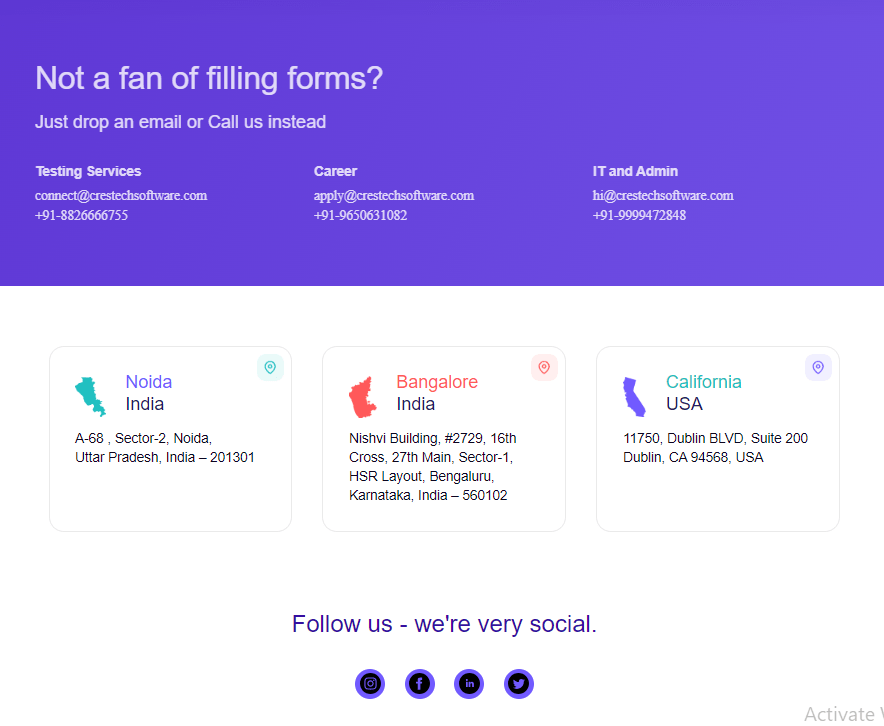Importance of Software Testing in the IT Industry
Testing software is really important in the IT industry for a couple of reasons:
-
Making Sure It’s Good Quality: Testing makes sure software is really good before people use it. This means finding and fixing any mistakes or problems early, so the final product works well and is easy to use.
-
Making Users Happy: Testing the software well makes it better for people who use it. Testing makes sure users are happy by fixing how it works, how fast it is, and how easy it is to use.
-
Keeping Things Safe: Testing finds problems in software that bad people could use. Testers check for security issues to keep hackers from stealing information.
-
Saving Money: Testing costs money at the beginning but saves money later. When you find and fix problems early, you avoid spending a lot of money on fixes and maintenance later.
-
Building Trust: GTesting software is crucial for maintaining a good reputation. When companies provide bug-free software, it builds trust with customers and partners, leading to long-term success.
-
Following Rules: Lots of industries have rules for software to follow and keep data safe. Testing checks if software follows these rules, preventing legal problems.
Growth and Evolution of Software Testing in India
Software testing in India has grown and changed a lot over time. It started small as just a small part of making software. But now, it’s really important on its own.
At first, testers would check software by hand to find mistakes. But as software became more complex, they started using tools to test faster and better.
Many companies from different countries asked India for help testing their software. Indian companies saw this as a chance to show they could do a great job and offered their services at fair prices.
Today, Indian testers use tools and methods to test software. They check if it works correctly, is fast enough, and is safe from hackers.
Software testing in India will probably continue to improve and become more extensive. More companies will trust Indian testers to ensure their software works well.
Advantages of Outsourcing Software Testing to India
Outsourcing software testing to India has many benefits:
-
Saves Money: Sending testing work to India costs less because workers there get paid less than in Western countries. So, companies can spend less on hiring people and buying equipment for their projects.
-
Skilled Workers: India has lots of folks skilled at testing software. A bunch of them studied computer science and got special certificates for testing. That means they’re good at their job and can test software using various methods and tools.
-
Time Advantage: India is in a time zone different from the US and Europe. So, when people in the US and Europe are sleeping, workers in India can keep working on projects. This helps to finish projects faster and get more work done.
-
High Quality: Indian testing companies have strict rules. They use the best methods to make sure software works well. This helps them find problems early. So, the software is better, and users are happier.
-
Flexibility: Companies can adjust how many workers they have for a project as needed. Doing this saves money and makes things work better.
-
Latest Tech: Indian testing companies always use the latest technology and methods. They use top-notch tools and equipment to test software, making the process better and quicker.
-
Focus on Important Things: Sending testing work to India helps companies concentrate on their strengths, so they can do more and earn more money.
Sending testing work to India is smart. It saves money, gets good work done fast, and lets companies concentrate on their strengths.
Challenges Faced by Software Testing Companies in India
Testing companies in India have lots of problems.
-
Making Sure Software is Good: It’s important to make sure the software works properly. But it can be difficult to do that when there isn’t much time or money.
-
Finding and Keeping Skilled People: It’s hard to find and keep good testers. There aren’t many good testers, so companies have to really try to make them happy.
-
Keeping Up with New Technology: In tech, stuff changes quickly. Companies must keep learning new things to stay up-to-date.
-
Talking and Working Together: It’s important to communicate and cooperate effectively with clients and teams. Sometimes, it’s hard because we speak different languages and live in different time zones.
-
Keeping Things Safe: Making sure that valuable information and thoughts are safe is really important. Businesses must have effective strategies to protect them.
-
Following Rules: Some industries have rules that companies must follow. This makes testing more difficult because companies need to make sure they follow these rules.
-
Using Resources Well: Businesses need to use their employees, tools, and resources effectively for proper testing. Finding the right balance can be hard, especially during busy times.
-
Managing Projects Well: It’s essential to ensure projects finish on time and don’t cost too much. This requires good leaders who can manage many projects at once.
-
Keeping Clients Happy: Companies must do what clients want and ensure they’re happy. Sometimes, this can be hard because things change or clients wish to do more than planned.
-
Dealing with Competition: There are many testing companies in India, so it’s hard to stand out. Companies need to do extraordinary things and be good to get noticed.
Compliance Landscape in Software Testing
The GDPR affects software testing companies a lot, especially when they work with data from European clients.
These companies need to do strict things to keep personal data safe, get clear permission to use data, and follow rules about what people can do with their data.
To follow the rules, these companies use strong codes to protect data, make data anonymous, and regularly check to make sure they’re following the rules.
ISO Standards in Software Testing
ISO standards are like quality and security rules that many people know about. Good software testing companies in India try to get certificates like ISO/IEC 27001 and ISO 9001 to show they’re serious about security and quality.
Getting and keeping these certificates means doing strict processes, paperwork, and always trying to get better.
By adhering to ISO standards, these companies instill confidence in their clients regarding the reliability of their testing processes.
Adapting to Agile and DevOps Environments
Cyber threats are happening more often and are getting more complex. Testing to make sure software is secure has become really important.
Companies in India that do testing focus a lot on security testing. They check for weaknesses, see how well apps can handle cyber-attacks, and make sure they follow security rules.
To do security testing right, it’s important to follow OWASP rules, do penetration testing, and use secure coding practices.
Data Privacy Concerns and Best Practices
Software testing companies prioritize keeping data private, especially when dealing with sensitive information during tests. They use techniques like anonymization and pseudonymization to protect personal data.
Moreover, these companies set up strict rules for who can access data, train their employees regularly on how to handle data properly, and take steps to stop data leaks. This helps them follow worldwide rules about data protection.



